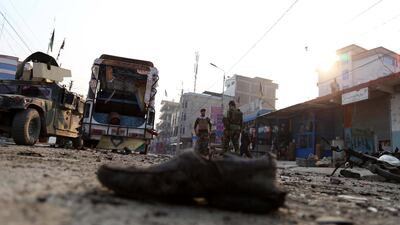The commander of the Taliban's "special forces" branch, known as the "Red Unit", was killed last week in Helmand province by Afghan forces, according to Afghanistan's main intelligence agency.
The National Directorate of Security (NDS) said Mullah Shah Wali, also known as Mullah Naser, was killed in an air operation in Helmand.
The province is a Taliban stronghold in the heartland of Afghanistan's lucrative drug trade.
Wali became the commander of the Red Unit as well as deputy shadow governor of Helmand province three years ago and was directly involved in Taliban offensives, the NDS said.
The "Red Unit" is thought to be equipped with advanced weapons, including night vision scopes, 82mm rockets, heavy machine guns and US-made assault rifles, according to the Afghan military.
______________
Read more:
Afghans report ISIL reign of terror in northern province
Afghan civilians pay high price in war against Taliban
As the Taliban advances in Helmand, Afghan soldiers pay the price
______________
Wali was killed alongside a suicide bomber and two other Taliban commanders in Helmand's Musa Qala district, according to the NDS.
The United States has worked hard to build up Afghan air support and attack capabilities since they were found inadequate after most foreign forces withdrew three years ago.
Elsewhere, at least six people were killed in the eastern city of Jalalabad on Sunday when a suicide bomber drove a motorcycle into a political rally.
A crowd had gathered in a sports stadium for a demonstration in support of president Ashraf Ghani, said Nangarhar province's police spokesman, Hazrat Hussain Mashriqiwal.
"Six people including a woman and a child have been killed and 13 more injured, all of them civilians," he said.
A local health director said some of the wounded were in a serious condition.
There was no immediate claim of responsibility for the attack, but Nangarhar province is considered a hotbed for ISIL, which emerged in Afghanistan in late 2015.
The Taliban also have an active presence in parts of the province.
Afghan and US officials have stepped up their attacks on ISIL, saying previously that the group was steadily losing territory with fighters largely confined to two or three districts in Nangarhar compared to around nine in January.
But the group has also intensified attacks across the country, particularly in the east and in the capital, Kabul, recruiting followers and in some places challenging the Taliban on their own turf.
Last month, a suicide attack claimed by ISIL militants hit a political gathering in Kabul, killing 14 people.
Political rivalries have also been intensifying in the country before next year's long-delayed district and parliamentary elections, which would pave the way for a 2019 presidential ballot.

